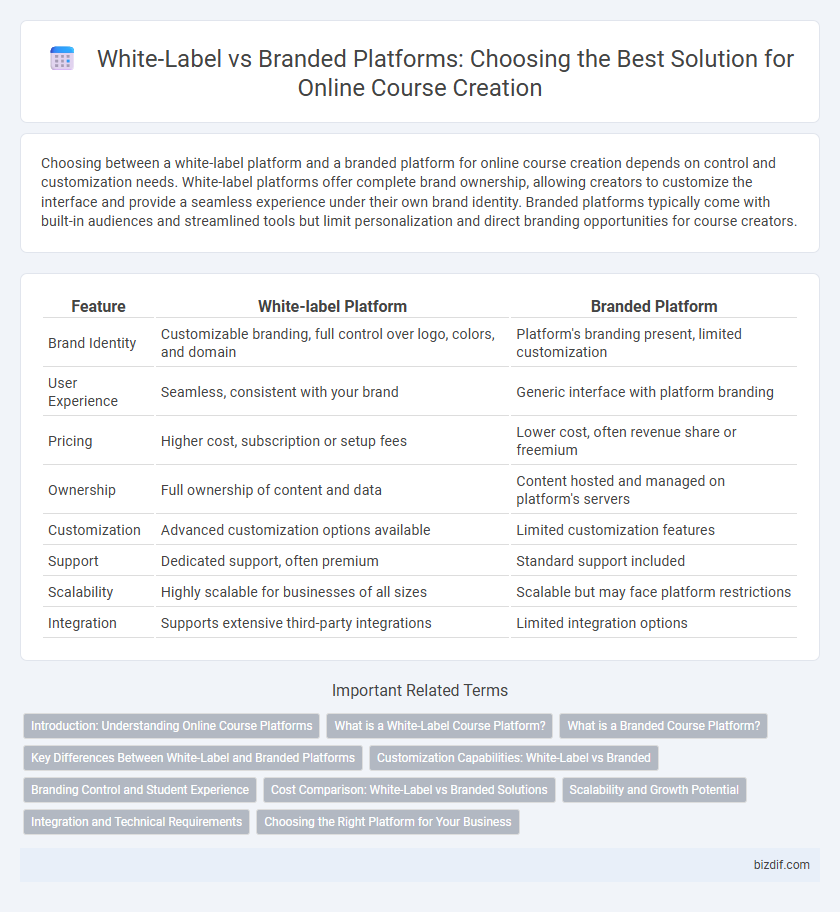Choosing between a white-label platform and a branded platform for online course creation depends on control and customization needs. White-label platforms offer complete brand ownership, allowing creators to customize the interface and provide a seamless experience under their own brand identity. Branded platforms typically come with built-in audiences and streamlined tools but limit personalization and direct branding opportunities for course creators.
Table of Comparison
| Feature | White-label Platform | Branded Platform |
|---|---|---|
| Brand Identity | Customizable branding, full control over logo, colors, and domain | Platform's branding present, limited customization |
| User Experience | Seamless, consistent with your brand | Generic interface with platform branding |
| Pricing | Higher cost, subscription or setup fees | Lower cost, often revenue share or freemium |
| Ownership | Full ownership of content and data | Content hosted and managed on platform's servers |
| Customization | Advanced customization options available | Limited customization features |
| Support | Dedicated support, often premium | Standard support included |
| Scalability | Highly scalable for businesses of all sizes | Scalable but may face platform restrictions |
| Integration | Supports extensive third-party integrations | Limited integration options |
Introduction: Understanding Online Course Platforms
White-label platforms offer customizable online course solutions that enable creators to maintain full brand identity, enhancing trust and recognition among learners. Branded platforms, however, provide ready-made course environments with inherent branding and community features, ideal for quick deployment but with limited personalization. Choosing between white-label and branded platforms depends on the creator's emphasis on brand control versus ease of setup and pre-existing audience access.
What is a White-Label Course Platform?
A white-label course platform allows instructors and organizations to fully customize the online learning environment with their own branding, including logos, colors, and domain names, creating a seamless, professional identity. This platform type offers full control over user experience and course content delivery, enabling scalability without revealing the underlying technology provider. Compared to branded platforms, white-label solutions enhance marketing capabilities and student trust by presenting a consistent, proprietary brand presence.
What is a Branded Course Platform?
A branded course platform is a customized online learning environment tailored to reflect the course creator's unique identity, including logos, colors, and domain names, ensuring consistent brand visibility. It enhances learner trust and loyalty by providing a seamless, professional experience aligned with the creator's business image. Unlike white-label platforms, branded platforms maintain direct association with the creator's brand, which bolsters marketing efforts and customer recognition.
Key Differences Between White-Label and Branded Platforms
White-label platforms allow course creators to customize the interface with their own branding while using a third-party infrastructure, enabling faster launch times and reduced development costs. Branded platforms are fully proprietary, offering complete control over design, features, and user experience but requiring more investment in development and maintenance. Key differences include customization level, ownership, scalability, and the extent of control over user data and platform updates.
Customization Capabilities: White-Label vs Branded
White-label platforms offer extensive customization capabilities, allowing course creators to fully tailor the user interface, branding, and domain to match their unique identity, enhancing brand consistency. Branded platforms typically provide limited customization options, often restricting changes to logos and color schemes, which may result in a less personalized learner experience. For course creators seeking complete control over design and branding, white-label solutions present a superior option compared to branded platforms.
Branding Control and Student Experience
White-label platforms offer complete branding control by allowing course creators to customize logos, colors, and domain names, ensuring a seamless brand identity throughout the student journey. Branded platforms, while simpler to use, limit customization options, potentially diluting brand presence and affecting the overall student experience. Prioritizing a white-label platform enhances brand consistency and fosters stronger student trust and engagement.
Cost Comparison: White-Label vs Branded Solutions
White-label platforms typically involve lower upfront costs and offer scalable pricing models, making them cost-effective for businesses aiming to launch online courses quickly. Branded platforms often require higher initial investments for custom development and ongoing maintenance but provide unique branding and tailored user experiences. Evaluating total cost of ownership, including subscription fees, customization expenses, and potential revenue sharing, is crucial when choosing between white-label and branded online course solutions.
Scalability and Growth Potential
White-label platforms offer significant scalability by allowing businesses to customize and rebrand courses without platform limitations, facilitating seamless expansion into new markets. Branded platforms provide strong brand identity but may restrict growth due to limited customization options and dependence on the platform's ecosystem. Companies prioritizing growth potential often choose white-label solutions to maintain control over user experience and scale operations efficiently.
Integration and Technical Requirements
White-label platforms offer seamless integration capabilities with existing tools and systems, allowing course creators to maintain a consistent brand experience without extensive technical overhead. Branded platforms often require more advanced technical expertise to customize and integrate third-party applications, potentially increasing development time and costs. Choosing between white-label and branded platforms depends on the creator's technical resources and the desired level of control over platform features and integrations.
Choosing the Right Platform for Your Business
White-label platforms offer customizable solutions that enable businesses to maintain their brand identity while leveraging established technology, making them ideal for those seeking scalability and control. Branded platforms provide ready-made, user-friendly interfaces but limit brand personalization and long-term flexibility. Selecting the right platform depends on factors like business goals, target audience, budget, and the level of customization required for a unique user experience.
White-label platform vs Branded platform Infographic

 bizdif.com
bizdif.com